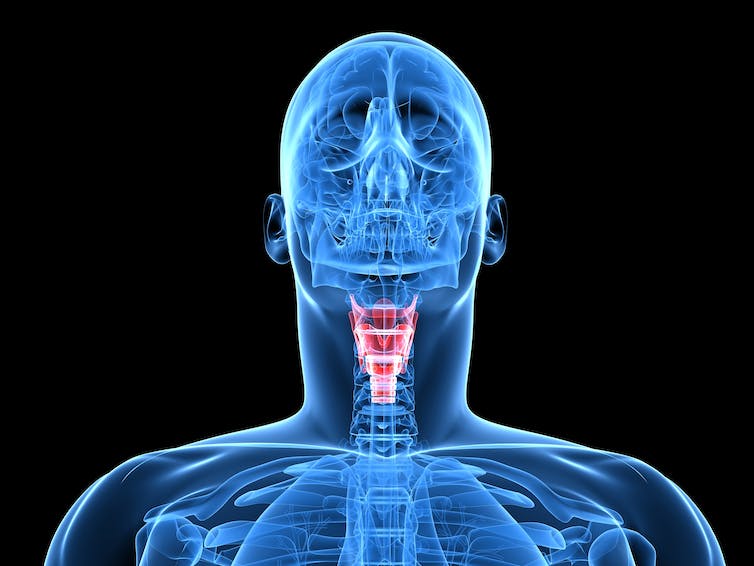Sir Elton John set a record at this year’s Glastonbury, becoming the most-watched headliner in the festival’s history, with more than 7 million people tuning in to the BBC to watch his last ever UK performance live.
The 76-year-old singer certainly delivered all his characteristic showmanship. But many who have followed his music over the decades will have noticed how much his voice has changed during his career – and not only because of the surgery he had in the 1980s to remove polyps from his vocal cords.
Equally, it’s not all down to the process of ageing. While it’s no mystery that this affects every part of our body, it isn’t the only reason that a person’s voice – even a professional singer like Sir Elton – can sound quite different over the years.
Table of Contents
The sound of your voice
The vocal cords are what produce the sound of your voice. They are located in the larynx, a part of the respiratory system that allows air to pass from your throat to your lungs. When air passes out of the lungs and through the larynx, it causes the vocal cords to vibrate – producing sound.
The vocal cords are composed of three main parts: the vocalis muscle, vocal ligament, and a mucous membrane (containing glands) to cover them. This keeps the surface moist and protects them from damage.
There are also approximately 17 other muscles in the larynx that can alter vocal cord position and tension – thus changing the sound produced.
Pre-puberty, there’s very little difference in the sound the vocal cords produce. But during puberty, hormones begin exerting their effects. This changes the structure of the larynx – making the “Adam’s apple” more prominent in men – and the length of the vocal cords. After puberty, they’re around 16mm in length in men, and 10mm in women.
Women’s vocal cords are also 20-30% thinner after puberty. These shorter, thinner vocal cords are the reason why women typically have higher voices than men.
Even after puberty, hormones can affect the voice. For instance, a woman’s voice may sound different depending on the stage of her menstrual cycle – with the best voice quality being in the ovulatory phase. This is because the glands produce most mucous during this phase, giving the vocal cords their best functional ability.
Research also shows that women taking the contraceptive pill show less variation in voice quality because the pill halts ovulation.
On the other hand, hormonal changes during the premenstrual phase impede the vocal cords, making them stiffer. This may explain why opera singers would be offered “grace days” in the 1960s to ensure they didn’t damage their vocal cords. And, because women’s vocal cords are thinner, they may also be more likely to suffer damage from overuse.
Everything ages
As with almost every other part of the body, vocal cords age. But these changes might not be as noticeable for everyone.
As we get older, the larynx begins increasing its mineral content, making it stiffer and more like bone than cartilage. This change can begin happening as early as your thirties – especially in men. This makes the vocal cords less flexible.
The muscles that allow the vocal cords to move also begin wasting (as do our other muscles) as we age. The ligaments and tissues that support the vocal cords also lose elasticity, becoming less flexible.

SciePro/ Shutterstock
There’s also a decrease in pulmonary muscle function, reducing the power of the air expelled from the lungs to create the sound. The number of glands that produce the protective mucus also decrease, alongside a reduction in the ability to control the larynx.
Lifestyle is a factor
While vocal cords age at largely the same rate in most people, many lifestyle factors can increase the risk of damage to them – and so can change the way your voice sounds.
Smoking, for example, causes localised inflammation, increased mucous production, but can also dry out the mucosal surfaces. Alcohol has a similar effect. Over time, these factors can damage the vocal cords and alter the voice’s sound.
Some over-the-counter and prescription drugs can also alter the voice – such as steroid inhalers used for laryngitis. Blood thinners may also damage the vocal cords and can cause polyps to form, making the voice sound raspy or hoarse. Muscle relaxants, too, can lead to irritation and vocal cord damage due to the drug allowing stomach acid to wash back into the larynx. Thankfully, the irritation and changes caused by these medications typically disappears after stopping use.
One other lifestyle factor can be overuse, which is typically seen in singers and other people who use their voice a lot during work, such as teachers and fitness instructors. This can lead to an uncommon
condition called Reinke’s oedema, which can also be caused by smoking. Reinke’s oedema causes fluid to swell in the vocal cords, changing the pitch of the voice – often making it deeper.
In extreme cases of Reinke’s oedema, surgery is needed to drain the fluid. But in most cases, rest and avoiding irritants (smoking and alcohol) is beneficial, while speech and language therapy can also address the change in sound.
Maintaining our vocal quality
While we can’t help some of the age-related changes that happen to our vocal cords, we can maintain some of our vocal quality and ability through continued use. This may explain why, in many cases, singers show significantly less vocal change with age than their non-singing counterparts.
Singing or reading out loud daily can give the vocal cords sufficient exercise to slow their decline.
Looking after your vocal cords is also important. Staying hydrated and limiting intake of alcohol and tobacco can help prevent high rates of decline and damage.
![]()
Adam Taylor does not work for, consult, own shares in or receive funding from any company or organisation that would benefit from this article, and has disclosed no relevant affiliations beyond their academic appointment.

























